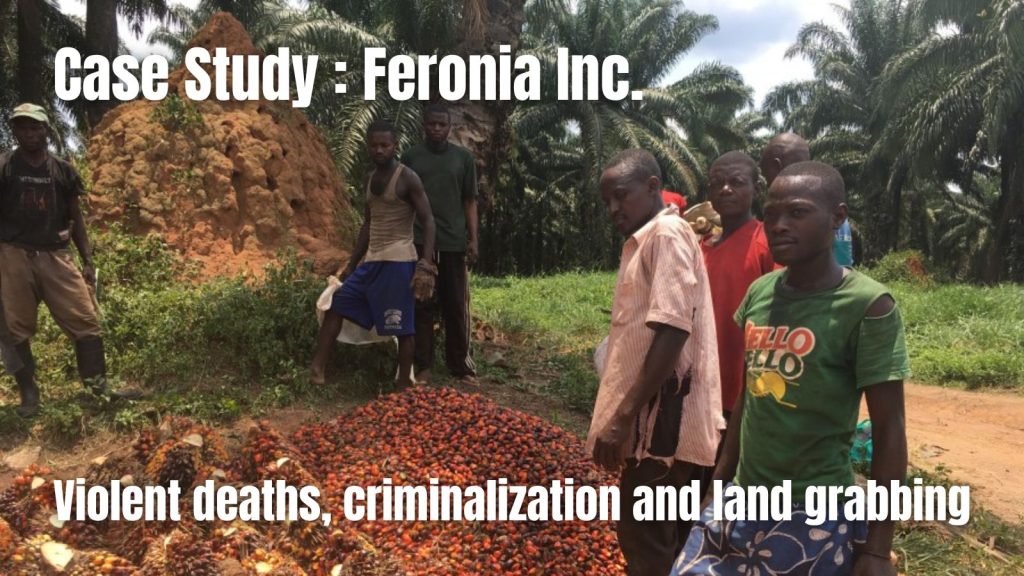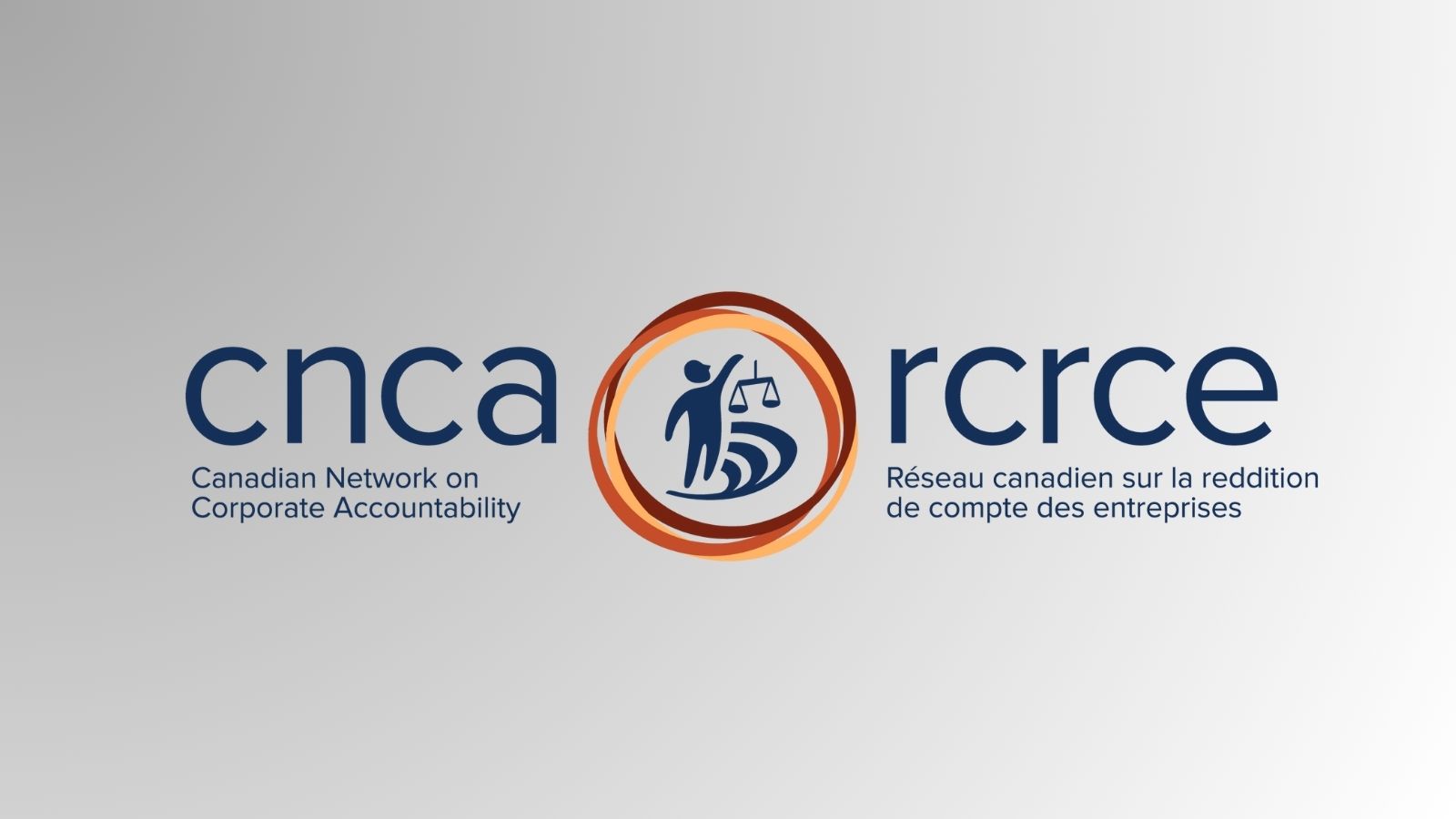Case 4 of 6 [1]
[View PDF]
Feronia Inc., a Canadian private equity firm that filed for bankruptcy in 2020,[2] was incorporated in the Cayman Islands, with head offices in Toronto, Ontario. It traded on the TSX-V.[3] CDC Group – the UK government’s financial development institution (FDI) – was its majority investor along with investment from various other European and US FDIs. Between 2009 and 2020, it owned Plantations et Huileries du Congo (PHC), a palm oil company in the Democratic Republic of Congo (DRC).
Summary
- In 1911, as part of the colonial land grabbing process prevalent throughout Africa at the time, palm oil groves were usurped from the communities that fall within what is now the Lokutu, Yaligimba and Boteka plantations, in the Democratic Republic of Congo (DRC). Rights to use the land were conceded to Lord Leverhulme, founder of the PHC palm oil company and co-founder of Unilever, the global food company.[4]
- Feronia benefited from this colonial legacy in 2009 when it purchased the rights to lease over 100,000 hectares of land from the DRC government, and when it acquired PHC as its subsidiary. 25,000 hectares of that land were used for palm oil production.
- A series of abuses have been reported over the lifespan of PHC, including during Feronia’s ownership, comprised of killings, intimidation, arbitrary arrest, wage theft and violations related to food security and to free, prior and informed consent,[5] with no access to justice.
- A 2018 complaint submitted by communities and allies to the International Complaints Mechanism (ICM) of the German, French and Dutch development banks dragged on without resolution for more than three years during Feronia’s ownership of PHC, and led to reprisals against those who filed the complaint.[6]
- Despite receiving numerous reports of ongoing violence and abuse that continues today,[7] European development banks provided approximately $150 million in funding to Feronia between 2013 and 2020.
The Detail
For just over a decade, private equity firms[8] and international development assistance have been funding large-scale land acquisition projects in Africa, like the palm oil plantations operated by Feronia’s subsidiary, PHC. Many of these projects gained access to land through the colonial model of land appropriation, and have operated in the midst of human rights abuses, violence, and community dissent. In many cases, local communities were not consulted and did not consent to the usurpation of their ancestral lands.[9] Far from providing the purported solution to food insecurity and so-called ‘underdevelopment’ in the region, large-scale palm oil plantations and other industrial-scale projects have done little to decrease local communities’ food insecurity.[10]
In 2009, Feronia acquired ownership of PHC,[11] along with its associated land concessions.[12] For over 100 years the plantations had been the site of violence and human rights abuses against workers and neighbouring community members, unjust labour practices and mistreatment of workers, environmental destruction, and rampant impunity – all of which contributed to profound mistrust of the company by impacted communities.[13] For a decade or more, communities had made numerous written requests to the DRC government, PHC and the development banks that fund the company, asking for discussions to determine the conditions upon which PHC is permitted to operate on the land.[14]
They have repeatedly questioned the legitimacy of the concessions licensed to Feronia when the company purchased PHC, and the lack of publicly available evidence of the boundaries of that land. When a land dispute in the Lokutu concession finally led to the intervention of provincial authorities in 2012, no record of the land title could be found in the provincial registry, and Feronia was only able to provide a certificate from 1955 that was found to be invalid.[15] Nevertheless, Feronia continued to ignore community demands to negotiate the return of their lands.[16], [17]
Feronia’s 2015 Social Impact Assessment Report referenced ongoing community grievances, concluding that they “appear to be a result of, and exacerbated by, ineffective communication between PHC management, their workforce, and non-worker communities.”[18] While the report suggested the need for Feronia to improve stakeholder engagement, this did not happen. In 2015 and 2016, when Feronia reorganized its concessions into several smaller parcels, not only were communities not consulted, but the process was allegedly fraught with “irregularities.”[19]
Prior to Feronia’s acquisition of the land rights – and then later, during its tenure as the owner of PHC – several people were killed or injured, reportedly at the hands of police, the military or PHC’s own private security:
- Residents of two communities located within the Lokutu plantation area allege that the company’s private security guard and national police killed four people between 1986 and 2007, including a child.[20]
- In 2015, Jeudi Bofete Engamboi, a PHC worker, was called into the local police and brutally beaten for allegedly stealing a handful of palm oil nuts from one of the plantations. He died from his injuries the following day. When his wife and others came to protest, she was shot and killed. Reports of similar abuse and torture had also been denounced in previous years but never investigated.[21]
- On March 16, 2019, the Congolese military shot at community members who had been demanding the return of their ancestral lands as well as legally owed wages for their work at the plantation.[22]
- On July 21, 2019, Joel Imbangola Lunea, from the community-based human rights organization Réseau d’Information et d’Appui aux ONG en République Démocratique du Congo (RIAO-RDC), was killed while at one of the plantations, according to eyewitness testimony. In the months leading up to his death, several members of RIAO-RDC had been receiving intimidation related to their work supporting communities filing a grievance against the company.[23] A PHC security guard was charged with the murder but was later acquitted after he was defended by a team of 32 company lawyers. Since Joel’s killing, several of his family members, including his wife, father, sister and her children, as well as his former boss, have also been killed.[24]
- The level of tension and conflict surrounding the plantations has been exacerbated by the numerous arbitrary detentions of community members based on unfounded claims by police officers that they had stolen palm oil nuts from the company.
Impacted communities have been raising the alarm about the violence and conflict at Feronia/PHC for decades and, to date, have been unable to access justice for harms incurred.[25] Throughout the time that Feronia operated the three plantations, the company and its major investors failed to take meaningful and swift steps to address the reported violence and killings. In 2013, the company received over $150 million from the European FDIs, despite persistent reports of human rights violations and the continued violation of free, prior and informed consent.[26]
Instead of responding immediately to ensure that the purported violence associated with PHC was effectively investigated, and developing mechanisms to ensure any ongoing abuses were ceased, Feronia focused on developing its own non-binding environmental and social action plan (ESAP) in 2013.[27] The ESAP was funded by the UK financial development institution, CDC Group, and was billed as a key component of CDC’s own due diligence process prior to investment in Feronia[28] – three years later, CDC Group would come to own 67% of Feronia.[29] In response to concerns raised by NGO reports and community members about the ongoing land conflict and violence, CDC released statements assuring that the ESAP would support improved engagement and environmental and social practices.[30] Both Feronia and CDC Group also asserted that Feronia was working toward certification by the Roundtable for Sustainable Palm Oil (RSPO) – although they never did obtain certification[31] – and that Feronia was adhering to the World Bank’s environmental and sustainability standards.[32]
In 2018, community members, with the support of community organization RIAO-RDC, filed a formal complaint with the German development bank, DEG, one of Feronia’s major European investors,[33] using the FDI’s Independent Complaints Mechanism (ICM). This was the second attempt at requesting formal mediation. One year prior, they had attempted to initiate a mediation process between the company and the communities, however the company walked out two weeks later.[34]
A year after the complaint was submitted, the ICM proposed a ‘mediation outline’ which was agreed to by both parties. However, four years later, there was still no resolution or substantial progress.
Meanwhile, after the 2018 complaint was filed, community members faced increased repression and violence, including at the hands of police and company security guards,[35] and in September 2019, several were arrested on bogus charges.[36] During this time, Feronia restructured, and eventually filed for bankruptcy in 2020. This prompted a new mediation proposal from the ICM and, along with the outbreak of the COVID-19 pandemic, was the purported justification for further delays in addressing community demands for justice.[37]
In 2020, Feronia’s remaining shares in PHC were acquired by another private equity firm, Straight KKM, based in Mauritius.[38] Meanwhile, PHC continues to be the target of community demands and frustration, and community members continue to suffer violence and intimidation associated with the plantation. In the first three months of 2021 alone, two community members were brutally killed, allegedly by company security guards.[39]
What if…?
If mandatory human rights due diligence legislation was in place, what would be different for the community members impacted by the ongoing land disputes and violence?
- Feronia would have had incentives to identify and assess the risk associated with ongoing community grievances about how PHC acquired the land and could have strengthened its stakeholder engagement plan to ensure it adequately responded to communities’ repeated requests to negotiate the conditions under which the company was authorized to use the land.
- If the company carried out effective human rights and environmental due diligence, it would have evaluated the high risk that the private security of its subsidiary, PHC, would continue to commit human rights abuses. It would have documented that risk in the company’s human rights and environmental due diligence reports, along with steps on how the company intended to mitigate ongoing abuses and prevent future ones from occurring.
- If Feronia failed to take concrete steps to mitigate or prevent further abuses, community members or human rights organizations that support them, such as RIAO-DRC, could have sought justice in a Canadian court, and Feronia would have had to account for and defend the steps it had taken since the abuses were first reported.





